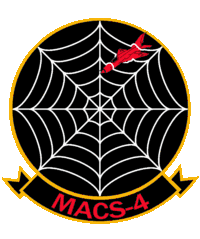Marine Air Control Squadron 4
| Marine Air Control Squadron 4 | |
|---|---|
|
MACS-4 Insignia | |
| Active |
5 May 1944 – 30 April 1947 30 June 1951 – 31 January 1971 15 June 1971 – present |
| Country | United States |
| Allegiance | United States of America |
| Branch | United States Marine Corps |
| Type | Aviation Command & Control |
| Role | Aerial surveillance & Air traffic control |
| Part of |
Marine Air Control Group 18 1st Marine Aircraft Wing |
| Garrison/HQ | Marine Corps Air Station Futenma |
| Engagements |
Vietnam War Operation Enduring Freedom |
| Commanders | |
| Current commander | LtCol Michael Hicks |
Marine Air Control Squadron 4 (MACS-4) is a United States Marine Corps aviation command and control squadron. The squadron provides aerial surveillance and air traffic control for the III Marine Expeditionary Force. They are based at Marine Corps Air Station Futenma and fall under the command of Marine Air Control Group 18 and the 1st Marine Aircraft Wing.
Subordinate units
- Air Traffic Control Detachment A – Witch-Doctors – MCAS Futenma, Japan
- Air Traffic Control Detachment B – White-Snakes - MCAS Iwakuni, Japan
- Tactical Air Operations Center – Vice-Squad - MCAS Futenma, Japan
- Headquarters and Service Detachment - MCAS Futenma, Japan
Mission
Provide air surveillance and the control of aircraft and Surface-To-Air weapons for antiair warfare; Continuous All-Weather radar and Non-Radar air traffic control service, and airspace management in support of a Marine Air-Ground Task Force (MAGTF)
History
Early years
Air Warning Squadron 13 was activated 5 May 1944 at Marine Corps Air Station Cherry Point, North Carolina and assigned to 1st Marine Air Warning Group, 9th Marine Aircraft Wing. On 12 August 1944 the squadron moved to Naval Air Station Vero Beach, Florida to assist in the air control program and give squadron personnel experience in night intercept problems. The squadron was responsible for operating an SCR-527 radar at Sebastian, the SCR-270 radars at Stuart and Roseland and the Radio direction finder (RDF) stations at Melbourne, Vero Beach and Stuart. The squadron departed NAS Vero Beach on 7 June 1945 heading for the west coast. They were redesignated 1 August 1946 to Marine Ground Control Intercept Squadron 4 and assigned to Marine Air Control Group 2. The squadron was deactivated 30 April 1947.
They were reactivated 30 June 1951 at Marine Corps Air Station Santa Ana, California and assigned to Marine Air Control Group 3, Air Fleet Marine Force, Pacific. Re-designated 15 February 1954 as Marine Air Control Squadron 4. They moved in July 1959 to Marine Corps Air Station Iwakuni, Japan and were assigned to Marine Wing Headquarters Group, 1st Marine Aircraft Wing. Their first deployment was to Thailand during May–July 1962 in connection with communist threat to that country.
Vietnam War
The squadron again relocated during October 1965 to [[Marine Corps Base Camp Pendleton]], California. They deployed during 1967 to Danang, Republic of Vietnam and assigned to 1st Marine Aircraft Wing. The squadron was reassigned during August 1967 to Marine Air Control Group 18, 1st Marine Aircraft Wing. They wee the first unit in the Marine Corps to utilize the Marine Tactical Data System (MTDS) which they operated from Monkey Mountain west of Danang from June 1967 to January 1971. The squadron departed Vietnam embarking on the USS Alamo (LSD-33) on 31 January 1971 to head back to MCAS Santa Ana, California. On that same day MACS-4 was officially deactivated. They were reactivated 15 June 1971 at MCAS Futenma, Okinawa, Japan and assigned to Marine Air Control Group 18, 1st Marine Aircraft Wing.
Global War on Terror
Elements of the squadron participated in support of Operation Enduring Freedom, April 2002 through March 2004.
See also
- Organization of the United States Marine Corps
- List of United States Marine Corps aviation support squadrons
Notes
References
 This article incorporates public domain material from websites or documents of the United States Marine Corps.
This article incorporates public domain material from websites or documents of the United States Marine Corps.
- Web


